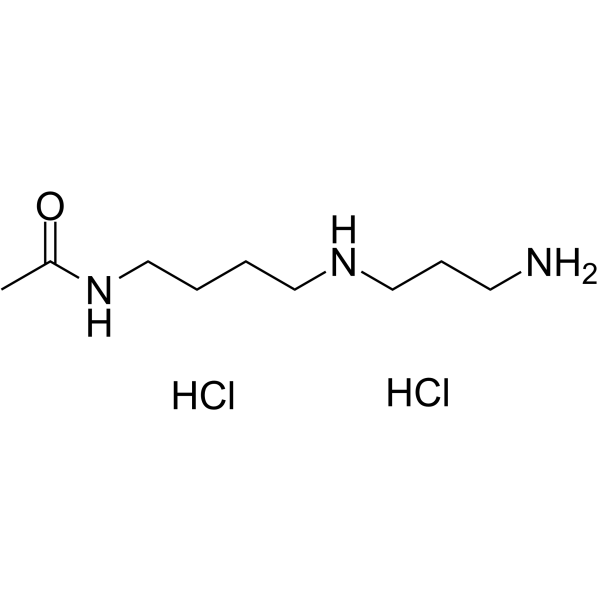 Home -
Products -
Proteasome/Ubiquitin -
Endogenous Metabolite -
N8-Acetylspermidine dihydrochloride
Home -
Products -
Proteasome/Ubiquitin -
Endogenous Metabolite -
N8-Acetylspermidine dihydrochloride

N8-Acetylspermidine dihydrochloride
CAS No. 34450-15-2
N8-Acetylspermidine dihydrochloride( —— )
Catalog No. M27096 CAS No. 34450-15-2
N8-Acetylspermidine dihydrochloride is a polyamine that regulates ischemic cardiac apoptosis and resultant cardiac dysfunction.
Purity : >98% (HPLC)
 COA
COA
 Datasheet
Datasheet
 HNMR
HNMR
 HPLC
HPLC
 MSDS
MSDS
 Handing Instructions
Handing Instructions
| Size | Price / USD | Stock | Quantity |
| 5MG | 115 | Get Quote |


|
| 10MG | 192 | Get Quote |


|
| 25MG | 385 | Get Quote |


|
| 50MG | 575 | Get Quote |


|
| 100MG | Get Quote | Get Quote |


|
| 200MG | Get Quote | Get Quote |


|
| 500MG | Get Quote | Get Quote |


|
| 1G | Get Quote | Get Quote |


|
Biological Information
-
Product NameN8-Acetylspermidine dihydrochloride
-
NoteResearch use only, not for human use.
-
Brief DescriptionN8-Acetylspermidine dihydrochloride is a polyamine that regulates ischemic cardiac apoptosis and resultant cardiac dysfunction.
-
DescriptionN8-Acetylspermidine dihydrochloride is a polyamine that regulates ischemic cardiac apoptosis and resultant cardiac dysfunction.
-
In Vitro——
-
In Vivo——
-
Synonyms——
-
PathwayProteasome/Ubiquitin
-
TargetEndogenous Metabolite
-
RecptorATPase| NF-κB| Nuclear factor of activated Tcells (NFAT)| p38 MAPK
-
Research Area——
-
Indication——
Chemical Information
-
CAS Number34450-15-2
-
Formula Weight260.2
-
Molecular FormulaC9H23Cl2N3O
-
Purity>98% (HPLC)
-
SolubilityIn Vitro:?DMSO : 100 mg/mL (384.32 mM)
-
SMILESCl.Cl.CC(=O)NCCCCNCCCN
-
Chemical Name——
Shipping & Storage Information
-
Storage(-20℃)
-
ShippingWith Ice Pack
-
Stability≥ 2 years
Reference
1.Francisco A, et al. Tomas-Barberan, Manuela M. Garcia-Grau, and Francisco Tomas-Lorente. Journal of Agricultural and Food Chemistry 1991 39 (2), 255-258
molnova catalog



related products
-
Petroselinic acid
Petroselinic acid is a monounsaturated omega-12 fatty acid found naturally in plant and animal oils and fats.
-
D-(+)-Turanose
D(+)-Turanose is a naturally occuring compound. It is a reducing disaccharide.
-
(3-Carboxypropyl)tri...
(3-Carboxypropyl)trimethylammonium chloride is a synthetic carnitine related compound used as a transporter substrate in the cloning and sequencing of human carnitine transporter 2 (CT2).



 Cart
Cart
 sales@molnova.com
sales@molnova.com

